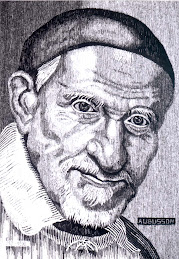EPILOGUE
St. Vincent de Paul's story continued after his death and was no less eventful and stirring than the record of his earthly life. Everyone agreed that he had died a saint. Bishops and cardinals, the aristocracy and common folk, kings and beggars; all vied with each other in testifying to his extraordinary virtues. Among the many distinguished people who attended his funeral on 28th September, were the Prince of Conté, the nuncio Piccolomini, and the Duchess d'Aiguillon. There was another memorial service, two days later, at Saint Germain l'Auxerrois which was organised by the priests of the Tuesday Conferences. On that occasion the preacher was the bishop of Puy de Dôme, Monsignor Maupas du Tour. The orator preached for more than two hours and declared that he hadn't said half of what he intended to say because there was so much in M. Vincent's life to talk about that he could have given a whole series of Lenten sermons on it. [1]
Two hundred and ninety witnesses gave evidence at the beatification process which went on for 69 years after Vincent's death. On 21th August, 1729, Benedict XIII inscribed him in the catalaogue of the blessed. He was canonised on 16th June, 1737. [2]
Meanwhile, the works started by Vincent were beginning to develop in an extraordinary way. The missionaries or "Lazarists" in France; "Paules" in Spain, "Vincentians" or "Vins" in other countries, were spreading all over the world. They came to Spain in 1704. Today they are working all over Europe, in America, and from Canada as far as Argentina, in Asia, and in the South Eastern islands of that continent [3]
Even more spectacular has been the expansion of the Daughters of Charity which is the biggest religious community in the Church. Today they number 35,000 and one third of these are Spanish.
At the present day, the confraternities of charity are a splendid, world wide body of volunteers who work for the benefit and the social advancement of "poor country people" as Vincent liked to call them. They work in collaboration with the St. Vincent de Paul Conferences which were founded in 1833 by Frederic Ozanam. These were inspired by St. Vincent de Paul and have him for their patron.
Altogether there are nearly a million people in the Church who are working and striving to keep alive and active the spirit of Vincent de Paul which is perhaps more necessary today than ever before. This is the spirit of God, himself, who sent Jesus to evangelise the poor by word and by deed.
